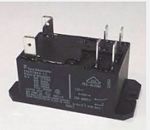An Ohm Meter
Ceramic Insulators
Electrical Tape
Element Pins
Evenheat Kilns
Evenheat Kilns & Ovens
Ground Connectors
Jen-Ken Kilns
Kiln Academy
Kiln Equipment
Kiln Relays
Kiln Repair Directory
Kiln Repairs
Kiln Spare Parts
Kilns
maintenance
Olympic Kilns
Paragon Kilns
Screwdrivers
Thermocouple
The Importance of Spare Parts
This is one of those stories that you don't believe... until it happens to you!
A few years ago, we had a visiting instructor with a full class of students teaching at our studio when the kiln just decided it wanted to be a rebel. There was a tiny waft of smoke, and then a error signal from the controller. Part of me wanted to freak out and run around the room with my arms waving while screaming expletives at the top of my lungs as this was the only kiln we had that was large enough to fire the student projects. Luckily, I quickly realized that I had an audience so, after a few deep breaths and some positive self-talk, I turned the kiln off and unplugged it.
 My first diagnostic step was to use my nut driver to unscrew the box where I saw the little smoke puff. And, yes... I know it's not an extra part but, everyone must have a 1/4" nut driver on hand in your kiln room. So, I opened the box and I see a small area that looks burned. It's the connector that attaches the kiln element to the electrical feed that runs to the relay. There's also a ceramic insulator that looks like it's seen better days, and a dead bug.
My first diagnostic step was to use my nut driver to unscrew the box where I saw the little smoke puff. And, yes... I know it's not an extra part but, everyone must have a 1/4" nut driver on hand in your kiln room. So, I opened the box and I see a small area that looks burned. It's the connector that attaches the kiln element to the electrical feed that runs to the relay. There's also a ceramic insulator that looks like it's seen better days, and a dead bug.
To make a short story short...the bug wiggled in, couldn't get out, and in it's frenzy, wiggled around the wire and caused a short when the wire touched the side of the box. This action killed the bug, and fried the connection. I know what you are all thinking... and, yes... we have big bugs here in Texas. This is not common, but it can happen.
Thankfully, kilns these days are made pretty "smart" so the controllers sense when a problem arises and shut the program down. With that said, all I needed now was a new ground connector and a new ceramic insulator. I went to my local hardware supply and picked up some hot tub ground connectors as a temporary measure and found some unglazed bisque beads to serve as my insulator. A few moments later I was up and running again. (I know... who the heck has unglazed bisque beads?)
We learned the importance of having spare parts on hand; Just like with a car, occasionally your kiln will hit a bump, or a bug in the road, and need a minor repair. You CAN do it, if you have some spare parts available. Here's what we recommend having on hand:
An Extra Set of Relays
Call the manufacturer of your kiln and ask them to send you a full set of relays for you kiln... some kilns use one and others can use up to three. That is why you need a full set! The best part is they are cheap. They usually run about $50 each and are worth their weight in gold. They do have a lifespan rated in "clicks." So, keep that in mind as age is less of a factor than usage. You just can't run your kiln with them. You can find an example here on our website.
 In the time since this happened, kiln manufacturers have introduced Solid State Relay Systems. As we just discussed, mechanical relays wear out and fail at some point but, that is not the case with solid state. Solid state means there are no moving parts, nothing to wear out and nothing to replace. Mercury relays are also an alternative but, they are more costly and include hazards associated with handling mercury if it breaks.
In the time since this happened, kiln manufacturers have introduced Solid State Relay Systems. As we just discussed, mechanical relays wear out and fail at some point but, that is not the case with solid state. Solid state means there are no moving parts, nothing to wear out and nothing to replace. Mercury relays are also an alternative but, they are more costly and include hazards associated with handling mercury if it breaks.
Ground Connectors
 Since you're already calling the manufacturer for relays, ask for a few of these too! Again, cheap but worth it.
Since you're already calling the manufacturer for relays, ask for a few of these too! Again, cheap but worth it.
Ceramic Insulators
 You guessed it! Since you're asking for relays and the ground connectors, make sure to ask them to add a ceramic insulator. (Now you sound very knowledgeable and they will be impressed!)
You guessed it! Since you're asking for relays and the ground connectors, make sure to ask them to add a ceramic insulator. (Now you sound very knowledgeable and they will be impressed!)
Extra Side Element & Element Pins
Elements can be finicky so, these are a must! The side elements are usually longer than the top element, but these could be MacGyver'd to be smaller if
you needed to replace your element on top and just couldn't wait to for it to come. These typically run about $30 each. Have a spare on hand, you'll sleep better at night. I know I do!
Thermocouple
This is truly for the die hards! These run somewhere around $45 dollars depending on the company. Again, your kiln won't run without it. Check out some of them on Kiln Frog.
Electrical Tape
Duh! Everybody loves tape!
Pliers, Phillips and Flat Head Screwdrivers, Wire Strippers, Set of Nut Drivers, and a Flush Cutter
These are basic tools you should have in your kiln survival kit. Pack these along with a shot of tequila for calm steady hands!
An Ohm Meter
Another weird, but handy tool to help you determine whether electrical amperage/voltage are getting to your elements. (Using this is a whole other conversation.) They come with directions and there are smarty pants types on YouTube who can walk you through it. Trust me, you'll need it at some point in your kiln life.
The phone number of someone who knows what their doing
If you need help, no problem! Or, sometimes it's just nice to talk to some for reassurance.. that's what we do! Kiln Frog's "Kiln Repair Directory" is a great resource of over one hundred kiln repair technicians across the US. When you call them and they tell you to get all this stuff, you'll look like a genius because you already have it.
A few years ago, we had a visiting instructor with a full class of students teaching at our studio when the kiln just decided it wanted to be a rebel. There was a tiny waft of smoke, and then a error signal from the controller. Part of me wanted to freak out and run around the room with my arms waving while screaming expletives at the top of my lungs as this was the only kiln we had that was large enough to fire the student projects. Luckily, I quickly realized that I had an audience so, after a few deep breaths and some positive self-talk, I turned the kiln off and unplugged it.
 My first diagnostic step was to use my nut driver to unscrew the box where I saw the little smoke puff. And, yes... I know it's not an extra part but, everyone must have a 1/4" nut driver on hand in your kiln room. So, I opened the box and I see a small area that looks burned. It's the connector that attaches the kiln element to the electrical feed that runs to the relay. There's also a ceramic insulator that looks like it's seen better days, and a dead bug.
My first diagnostic step was to use my nut driver to unscrew the box where I saw the little smoke puff. And, yes... I know it's not an extra part but, everyone must have a 1/4" nut driver on hand in your kiln room. So, I opened the box and I see a small area that looks burned. It's the connector that attaches the kiln element to the electrical feed that runs to the relay. There's also a ceramic insulator that looks like it's seen better days, and a dead bug.To make a short story short...the bug wiggled in, couldn't get out, and in it's frenzy, wiggled around the wire and caused a short when the wire touched the side of the box. This action killed the bug, and fried the connection. I know what you are all thinking... and, yes... we have big bugs here in Texas. This is not common, but it can happen.
Thankfully, kilns these days are made pretty "smart" so the controllers sense when a problem arises and shut the program down. With that said, all I needed now was a new ground connector and a new ceramic insulator. I went to my local hardware supply and picked up some hot tub ground connectors as a temporary measure and found some unglazed bisque beads to serve as my insulator. A few moments later I was up and running again. (I know... who the heck has unglazed bisque beads?)
We learned the importance of having spare parts on hand; Just like with a car, occasionally your kiln will hit a bump, or a bug in the road, and need a minor repair. You CAN do it, if you have some spare parts available. Here's what we recommend having on hand:
An Extra Set of Relays
Call the manufacturer of your kiln and ask them to send you a full set of relays for you kiln... some kilns use one and others can use up to three. That is why you need a full set! The best part is they are cheap. They usually run about $50 each and are worth their weight in gold. They do have a lifespan rated in "clicks." So, keep that in mind as age is less of a factor than usage. You just can't run your kiln with them. You can find an example here on our website.
 In the time since this happened, kiln manufacturers have introduced Solid State Relay Systems. As we just discussed, mechanical relays wear out and fail at some point but, that is not the case with solid state. Solid state means there are no moving parts, nothing to wear out and nothing to replace. Mercury relays are also an alternative but, they are more costly and include hazards associated with handling mercury if it breaks.
In the time since this happened, kiln manufacturers have introduced Solid State Relay Systems. As we just discussed, mechanical relays wear out and fail at some point but, that is not the case with solid state. Solid state means there are no moving parts, nothing to wear out and nothing to replace. Mercury relays are also an alternative but, they are more costly and include hazards associated with handling mercury if it breaks.Ground Connectors
 Since you're already calling the manufacturer for relays, ask for a few of these too! Again, cheap but worth it.
Since you're already calling the manufacturer for relays, ask for a few of these too! Again, cheap but worth it.Ceramic Insulators
 You guessed it! Since you're asking for relays and the ground connectors, make sure to ask them to add a ceramic insulator. (Now you sound very knowledgeable and they will be impressed!)
You guessed it! Since you're asking for relays and the ground connectors, make sure to ask them to add a ceramic insulator. (Now you sound very knowledgeable and they will be impressed!)Extra Side Element & Element Pins
Elements can be finicky so, these are a must! The side elements are usually longer than the top element, but these could be MacGyver'd to be smaller if
you needed to replace your element on top and just couldn't wait to for it to come. These typically run about $30 each. Have a spare on hand, you'll sleep better at night. I know I do!
Thermocouple
This is truly for the die hards! These run somewhere around $45 dollars depending on the company. Again, your kiln won't run without it. Check out some of them on Kiln Frog.
Electrical Tape
Duh! Everybody loves tape!
Pliers, Phillips and Flat Head Screwdrivers, Wire Strippers, Set of Nut Drivers, and a Flush Cutter
These are basic tools you should have in your kiln survival kit. Pack these along with a shot of tequila for calm steady hands!
An Ohm Meter
Another weird, but handy tool to help you determine whether electrical amperage/voltage are getting to your elements. (Using this is a whole other conversation.) They come with directions and there are smarty pants types on YouTube who can walk you through it. Trust me, you'll need it at some point in your kiln life.
The phone number of someone who knows what their doing
If you need help, no problem! Or, sometimes it's just nice to talk to some for reassurance.. that's what we do! Kiln Frog's "Kiln Repair Directory" is a great resource of over one hundred kiln repair technicians across the US. When you call them and they tell you to get all this stuff, you'll look like a genius because you already have it.
More from:
An Ohm Meter
Ceramic Insulators
Electrical Tape
Element Pins
Evenheat Kilns
Evenheat Kilns & Ovens
Ground Connectors
Jen-Ken Kilns
Kiln Academy
Kiln Equipment
Kiln Relays
Kiln Repair Directory
Kiln Repairs
Kiln Spare Parts
Kilns
maintenance
Olympic Kilns
Paragon Kilns
Screwdrivers
Thermocouple









Leave a comment